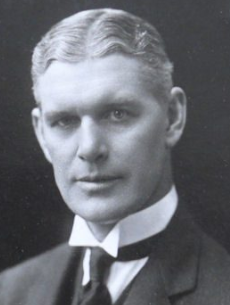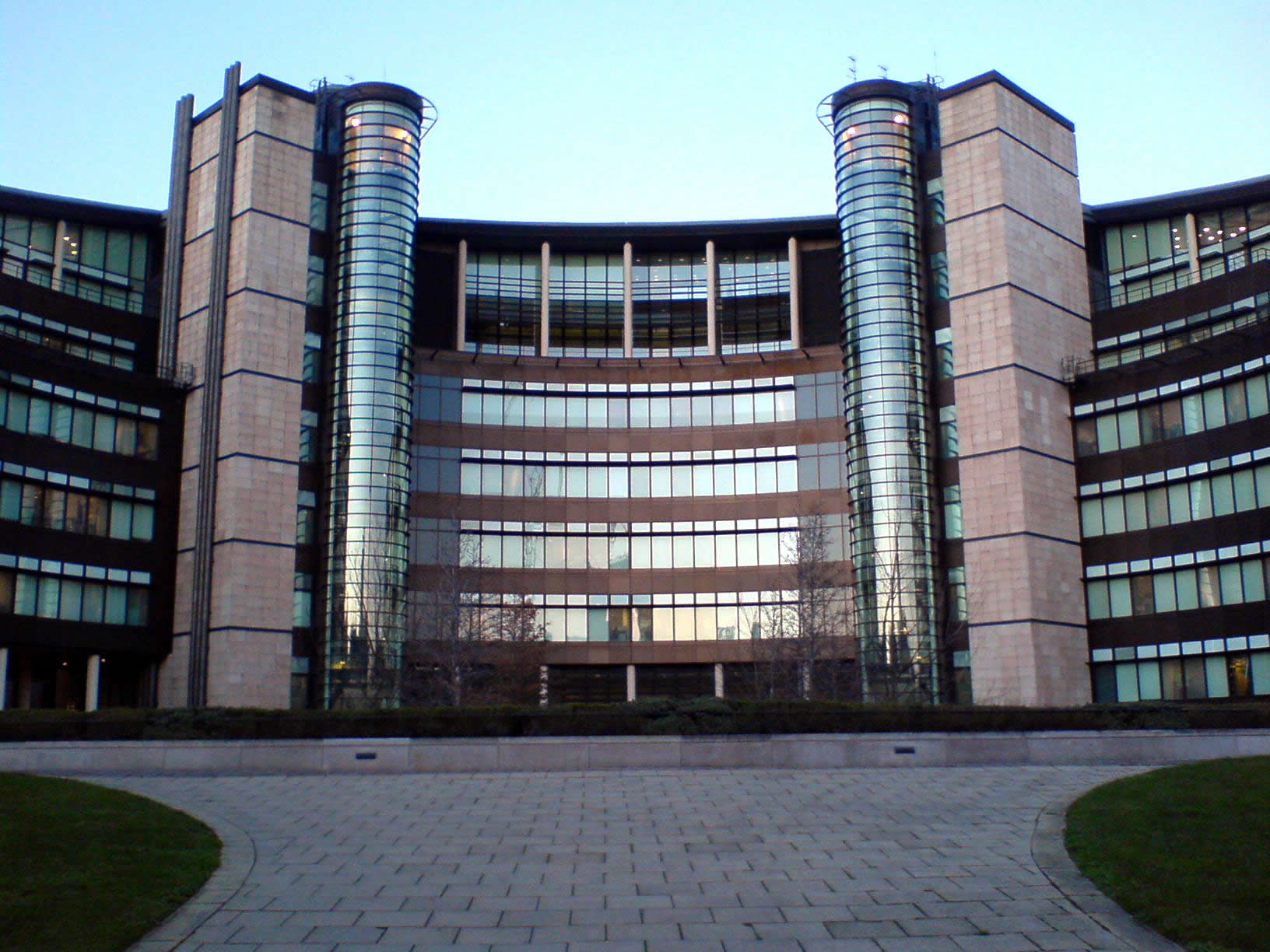|
William Whyte (banker)
Sir William Whyte FRSE (1878–1945) was a 20th-century Scottish banker who served as President of the Institute of Bankers in Scotland from 1940 to 1942. He was one of the instigators of the Royal Bank of Scotland's 20th century expansion programme. Life He was born in Kinross on 14 August 1878. In September 1893 he was apprenticed as a banker at the Royal Bank of Scotland in Kinross. He later transferred to the Ayr branch before becoming the accountant at the Saltcoats branch. In February 1899 he made an important transfer the bank's London branch. The London branch was often the chosen area for future senior staff. Staying at the London branch he became Accountant in 1918 and became Joint Manager in 1921. He became sole Manager in January 1924. In February 1929 he returned to Scotland as Deputy General Manager at the Royal Bank's Headquarters at Dundas House in Edinburgh. He was involved in the expansion of the bank: acquiring Williams Deacon's Bank in Manchester and ... [...More Info...] [...Related Items...] OR: [Wikipedia] [Google] [Baidu] |
William Whyte In 1918
William is a masculine given name of Norman French origin.Hanks, Hardcastle and Hodges, ''Oxford Dictionary of First Names'', Oxford University Press, 2nd edition, , p. 276. It became very popular in the English language after the Norman conquest of England in 1066,All Things William"Meaning & Origin of the Name"/ref> and remained so throughout the Middle Ages and into the modern era. It is sometimes abbreviated "Wm." Shortened familiar versions in English include Will, Wills, Willy, Willie, Liam, Bill, and Billy. A common Irish form is Liam. Scottish diminutives include Wull, Willie or Wullie (as in Oor Wullie or the play ''Douglas''). Female forms are Willa, Willemina, Wilma and Wilhelmina. Etymology William is related to the German given name ''Wilhelm''. Both ultimately descend from Proto-Germanic ''*Wiljahelmaz'', with a direct cognate also in the Old Norse name ''Vilhjalmr'' and a West Germanic borrowing into Medieval Latin ''Willelmus''. The Proto-German ... [...More Info...] [...Related Items...] OR: [Wikipedia] [Google] [Baidu] |
John Brown Clark
John Brown Clark or Clarke CBE LLD FRSE (30 April 1861 – 19 July 1947) was a Scottish mathematician. He was headmaster of George Heriot’s School from 1908 to 1926. He served as Vice President of the Royal Society of Edinburgh 1931–34. Life He was born in West Linton on 30 April 1861 the son of George Clark from Newbigging, South Lanarkshire. He attended West Linton School and then from 1877 the Heriot School at Abbeyhill in Edinburgh. From 1881 he trained at the Established Church Training College in Edinburgh. From 1883 to 1885 he served as an assistant teacher at St Leonards school in Edinburgh, then studied for a degree at the University of Edinburgh, graduating with and MA in 1889. He then obtained a job teaching mathematics at George Heriot’s School. In 1908 he succeeded David Fowler Lowe as headmaster and served in that role until 1926. He was succeeded in his role by William Gentle FRSE. In 1891 he was elected a Fellow of the Royal Society of Edinburgh, his p ... [...More Info...] [...Related Items...] OR: [Wikipedia] [Google] [Baidu] |
Scottish Bankers
Scottish usually refers to something of, from, or related to Scotland, including: *Scottish Gaelic, a Celtic Goidelic language of the Indo-European language family native to Scotland *Scottish English *Scottish national identity, the Scottish identity and common culture *Scottish people, a nation and ethnic group native to Scotland *Scots language, a West Germanic language spoken in lowland Scotland *Symphony No. 3 (Mendelssohn), a symphony by Felix Mendelssohn known as ''the Scottish'' See also *Scotch (other) *Scotland (other) *Scots (other) *Scottian (other) *Schottische The schottische is a partnered country dance that apparently originated in Bohemia. It was popular in Victorian era ballrooms as a part of the Bohemian folk-dance craze and left its traces in folk music of countries such as Argentina ("chotis"Span ... * {{disambiguation Language and nationality disambiguation pages ca:Escocès ... [...More Info...] [...Related Items...] OR: [Wikipedia] [Google] [Baidu] |
People From Perth And Kinross
A person ( : people) is a being that has certain capacities or attributes such as reason, morality, consciousness or self-consciousness, and being a part of a culturally established form of social relations such as kinship, ownership of property, or legal responsibility. The defining features of personhood and, consequently, what makes a person count as a person, differ widely among cultures and contexts. In addition to the question of personhood, of what makes a being count as a person to begin with, there are further questions about personal identity and self: both about what makes any particular person that particular person instead of another, and about what makes a person at one time the same person as they were or will be at another time despite any intervening changes. The plural form "people" is often used to refer to an entire nation or ethnic group (as in "a people"), and this was the original meaning of the word; it subsequently acquired its use as a plural form of per ... [...More Info...] [...Related Items...] OR: [Wikipedia] [Google] [Baidu] |
1945 Deaths
1945 marked the end of World War II and the fall of Nazi Germany and the Empire of Japan. It is also the only year in which Nuclear weapon, nuclear weapons Atomic bombings of Hiroshima and Nagasaki, have been used in combat. Events Below, the events of World War II have the "WWII" prefix. January * January 1 – WWII: ** Nazi Germany, Germany begins Operation Bodenplatte, an attempt by the ''Luftwaffe'' to cripple Allies of World War II, Allied air forces in the Low Countries. ** Chenogne massacre: German prisoners are allegedly killed by American forces near the village of Chenogne, Belgium. * January 6 – WWII: A German offensive recaptures Esztergom, Kingdom of Hungary (1920–1946), Hungary from the Russians. * January 12 – WWII: The Soviet Union begins the Vistula–Oder Offensive in Eastern Europe, against the German Army (Wehrmacht), German Army. * January 13 – WWII: The Soviet Union begins the East Prussian Offensive, to eliminate German forces in East Pruss ... [...More Info...] [...Related Items...] OR: [Wikipedia] [Google] [Baidu] |
1878 Births
Events January–March * January 5 – Russo-Turkish War – Battle of Shipka Pass IV: Russian and Bulgarian forces defeat the Ottoman Empire. * January 9 – Umberto I becomes King of Italy. * January 17 – Battle of Philippopolis: Russian troops defeat the Turks. * January 23 – Benjamin Disraeli orders the British fleet to the Dardanelles. * January 24 – Russian revolutionary Vera Zasulich shoots at Fyodor Trepov, Governor of Saint Petersburg. * January 28 – ''The Yale News'' becomes the first daily college newspaper in the United States. * January 31 – Turkey agrees to an armistice at Adrianople. * February 2 – Greece declares war on the Ottoman Empire. * February 7 – Pope Pius IX dies, after a 31½ year reign (the longest definitely confirmed). * February 8 – The British fleet enters Turkish waters, and anchors off Istanbul; Russia threatens to occupy Istanbul, but does not carry out the threat. * Febru ... [...More Info...] [...Related Items...] OR: [Wikipedia] [Google] [Baidu] |
Scottish Travel Association
Scottish usually refers to something of, from, or related to Scotland, including: * Scottish Gaelic, a Celtic Goidelic language of the Indo-European language family native to Scotland * Scottish English *Scottish national identity, the Scottish identity and common culture * Scottish people, a nation and ethnic group native to Scotland * Scots language, a West Germanic language spoken in lowland Scotland *Symphony No. 3 (Mendelssohn), a symphony by Felix Mendelssohn known as ''the Scottish'' See also *Scotch (other) *Scotland (other) *Scots (other) *Scottian (other) *Schottische The schottische is a partnered country dance that apparently originated in Bohemia. It was popular in Victorian era ballrooms as a part of the Bohemian folk-dance craze and left its traces in folk music of countries such as Argentina ("chotis"Span ... * {{disambiguation Language and nationality disambiguation pages ca:Escocès ... [...More Info...] [...Related Items...] OR: [Wikipedia] [Google] [Baidu] |
Scottish Council On Industry
The Scottish Council for Development and Industry (SCDI), founded in 1931, is a non-governmental, membership organisation which aims to strengthen Scotland's economic competitiveness through influencing government and key stakeholders to create sustainable economic prosperity for Scotland. SCDI has circa 1,200 members across Scotland's private, public & social economy sectors, including manufacturing and service sectors, universities and colleges, local government and enterprise networks, trade associations and professional bodies, arts organisations, churches and trade unions. Structure SCDI's lead officers are the President, Chairman and Chief Executive *President: Shonaig Macpherson CBE *Chairman: Joanna Boag-Thomson *Chief Executive: Sara Thiam SCDI is led by the following Committees: *SCDI Board – the strategic leadership for the organisation *SCDI Policy Committee – the lead body for SCDI policy development SCDI also has four regional committees, and an Internat ... [...More Info...] [...Related Items...] OR: [Wikipedia] [Google] [Baidu] |
Scottish Economic Committee
Scottish usually refers to something of, from, or related to Scotland, including: * Scottish Gaelic, a Celtic Goidelic language of the Indo-European language family native to Scotland * Scottish English *Scottish national identity, the Scottish identity and common culture * Scottish people, a nation and ethnic group native to Scotland * Scots language, a West Germanic language spoken in lowland Scotland *Symphony No. 3 (Mendelssohn), a symphony by Felix Mendelssohn known as ''the Scottish'' See also *Scotch (other) *Scotland (other) *Scots (other) *Scottian (other) *Schottische The schottische is a partnered country dance that apparently originated in Bohemia. It was popular in Victorian era ballrooms as a part of the Bohemian folk-dance craze and left its traces in folk music of countries such as Argentina ("chotis"Span ... * {{disambiguation Language and nationality disambiguation pages ca:Escocès ... [...More Info...] [...Related Items...] OR: [Wikipedia] [Google] [Baidu] |
Earl Haig Fund
The Haig Fund (more properly the Earl Haig Fund) is a charity set up in 1921 by Field Marshal Douglas Haig, 1st Earl Haig. History In response to the poem ''In Flanders Field'' by John McCrae, Moina Michael started selling silk poppies in 1918 to raise funds for ex-servicemen. The "Disabled Society" was started in 1920 for disabled ex-servicemen and to raise funds for it Anna Guérin organised the production and sale of silk poppies. In 1921 Guérin persuaded Haig to adopt the poppy as the symbol of the Royal British Legion, however demand exceeded supply. In 1922 George Howson pledged that the disabled society could provide the poppies, which under the name of "The Poppy Factory" they continue to do. On 1 January 1994 the words on the central black button were changes from "Haig Fund" to "Poppy Appeal". The Haig Fund continues to support veterans from all conflicts and other military actions involving British Armed Forces up to the present day. Its members sell remembrance ... [...More Info...] [...Related Items...] OR: [Wikipedia] [Google] [Baidu] |
Scottish Widows
Scottish Widows is a life insurance and pensions company located in Edinburgh, Scotland, and is a subsidiary of Lloyds Banking Group. Its product range includes life assurance and pensions. The company has been providing financial services to the UK market since 1815. The company sells products through independent financial advisers, direct to customers and through Lloyds Banking Group bank branches. The investment and asset management arm (Scottish Widows Investment Partnership) was sold in 2013 to Aberdeen Asset Management. History In March 1812, a number of prominent Scotsmen gathered in the Royal Exchange Coffee Rooms in Edinburgh. They were there to discuss setting up 'a general fund for securing provisions to widows, sisters and other female relatives' of fundholders so that they would not be plunged into poverty on the death of the fundholder during and after the Napoleonic Wars. Scottish Widows' Fund and Life Assurance Society opened in 1815 as Scotland's first mutual lif ... [...More Info...] [...Related Items...] OR: [Wikipedia] [Google] [Baidu] |

_1938.jpg)


